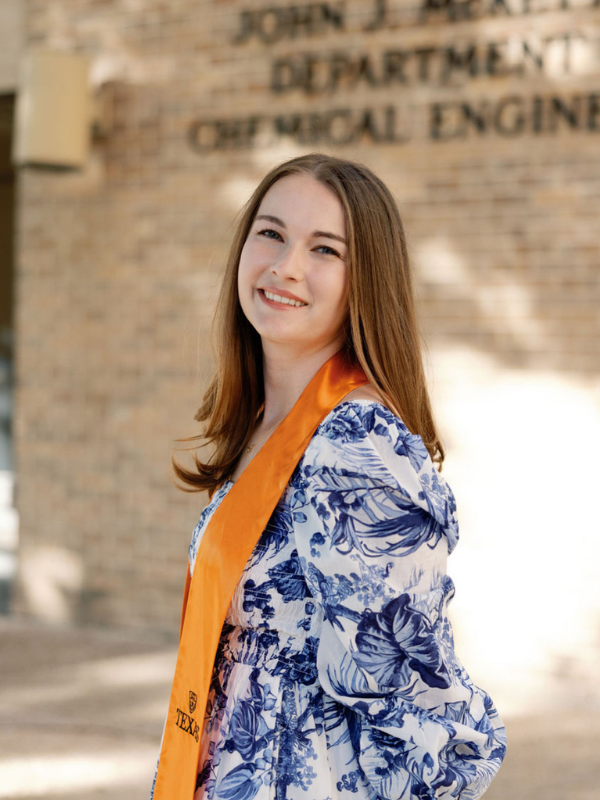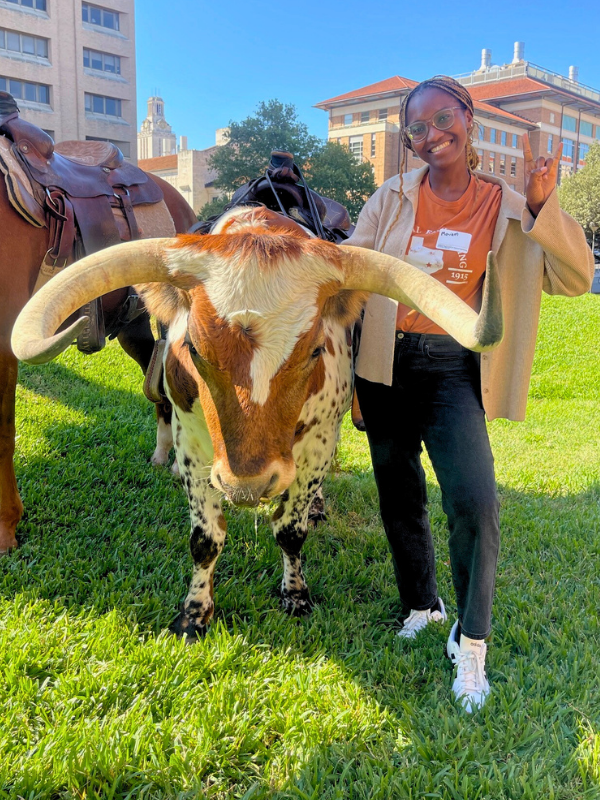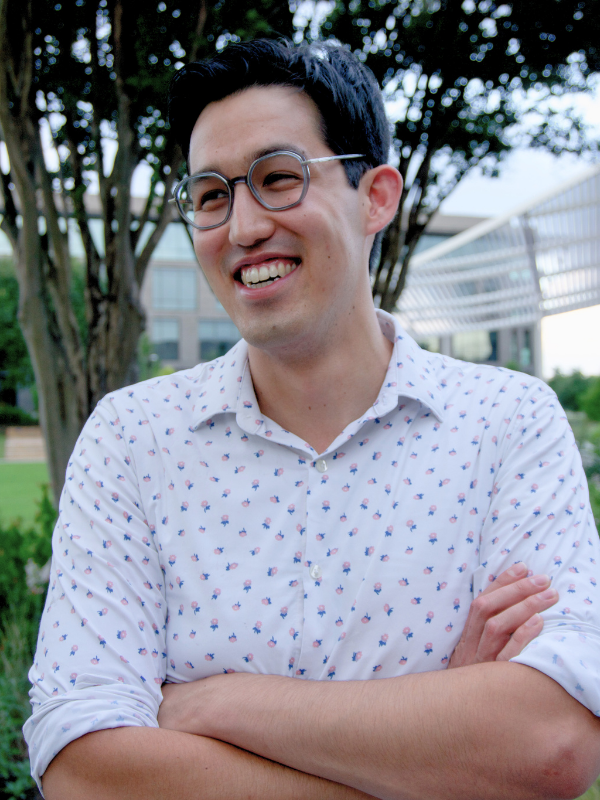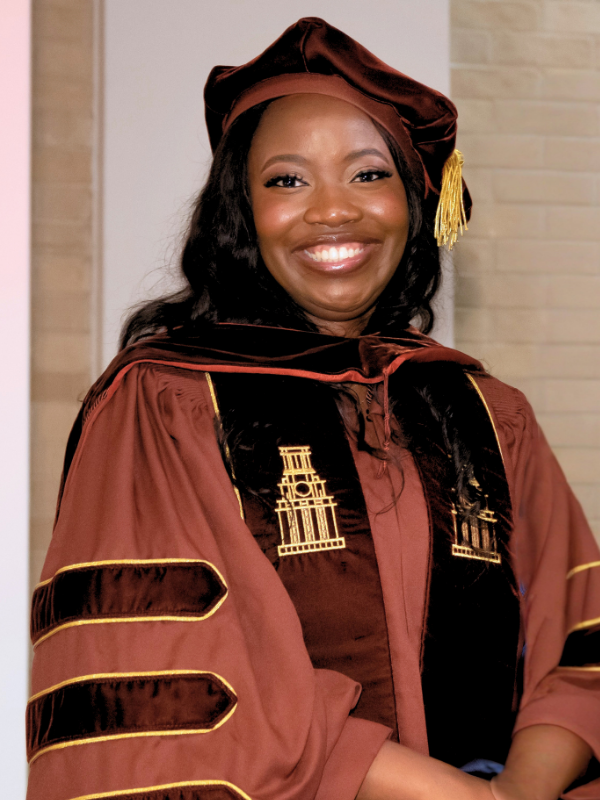2025 graduates entered college at the start of a pandemic. Uncertain of their future in the face of a shifting global economy, students observed, adapted and course-corrected to make the best of their education experience. Texas ChE connected with a few to ask what they'll remember most about the department and what their plans are for the future. From continuing research in a biotech lab to process engineering, Texas ChE graduates are off to do great things.
UNDERGRADUATE
Codi McMillan | Waco, Texas
 Q: Tell us about your time here, and how did you get involved at UT? I was raised as a Longhorn, so growing up I had experienced campus and some of UT’s culture. Despite this, I was still blown away by UT and all of its incredible people.
Q: Tell us about your time here, and how did you get involved at UT? I was raised as a Longhorn, so growing up I had experienced campus and some of UT’s culture. Despite this, I was still blown away by UT and all of its incredible people.
My first impression of student life at UT was how connected the chemical engineering students seemed. It didn’t take long for me to join UT’s student chapter of AIChE (American Institute of Chemical Engineers). Over the years, AIChE has given me some of my closest friends, and I even had the opportunity to give back to AIChE by serving as President. Outside of AIChE I participated in greek life, joining Kappa Delta my freshman year, and met some amazing women! I have now been roommates with Kappa Delta’s for three years, and we even plan to live together this next year as we enter the real world!
Q: What are your plans after graduation? I am moving to Frisco, Texas (near Dallas) to work at FM, the world’s largest commercial property insurer based out of Rhode Island, as a consultant engineer. My job starts in early June, so during May I hope to travel and make some memories with friends!
Q: Your most memorable moment at UT… It’s hard to choose just one, but the first football game of every season stands out. I always get sentimental when the entire stadium sings Eyes of Texas for the first time of the season.
Q: What will you miss most about the McKetta Department of Chemical Engineering? The people in McKetta are truly special. The community we have is unique, and very few other colleges at UT get to experience this type of community. Even though we joke about our building, the CPE, I will miss it every day since it holds some of my most treasured memories and favorite people. All of my successes and failures that helped me grow into who I am today happened at the CPE, and I can’t believe I’m leaving the place that has become my home in so many ways.
The only thing I may not miss is the dreaded CPE Cold.
GRADUATES
Mariam Balogun | Lagos, Nigeria
Research Lab | Brennecke Research Group
Undergrad| B.S. Chemical Engineering, University of Kansas
 Q: Tell us about your time here... I started my PhD in the fall of 2020 during COVID, which was a huge shift, and joined Professor Joan Brennecke’s research group to study the application of CO2 capture using Ionic Liquids and membranes.
Q: Tell us about your time here... I started my PhD in the fall of 2020 during COVID, which was a huge shift, and joined Professor Joan Brennecke’s research group to study the application of CO2 capture using Ionic Liquids and membranes.
Ionic liquids, low vapor pressure salts at room temperature made of cations and anions, are really good at absorbing CO2 at different pressures and have a very low solubility of CH4 and N2, making them an ideal solvent for separating CO2 from natural gas (primarily composed of methane) and flue gas (mostly nitrogen). Ionic liquids can be useful in the natural gas industry, separating CO2 from CH4, and for post-combustion capture, separating CO2 from N2–both contributing to less atmospheric CO2 emission during industrial processes.
Being involved with different organizations at UT offered a great support system professionally and socially. I served as the public relations officer for the chemical engineering Graduate Leadership Council (GLC), professional development chair for the CISTAR Student Leadership Council, and ultimately served as president for the Graduates for Underrepresented Minorities (GUM). I also had the opportunity to intern at Intel in the summer of 2024.
Q: What are your plans after graduation? I will be starting my career in industry as a module process development engineer in Intel, Oregon. I am also looking forward to adventurous opportunities in Oregon.
Q: Best advice for preserving mental health / support while in ChE program? I would recommend being involved in graduate student organizations to connect with other graduate students within and outside the program. It helps knowing that you are not alone in the Ph.D. journey. Austin is a great city to explore and disconnect from research. I would recommend celebrating every small and big milestone as you go along. For me, it was exploring Austin’s food scene with friends.
Q: What will you miss most about the McKetta Department of Chemical Engineering? I will miss the people I connected with at UT Austin, and the social events that kept me sane throughout the program. I will also miss attending research conferences either for recruitment or research presentations.
Jay T. Bender | Boulder, CO
Research Labs | The Resasco Lab + Milliron Research Group
Undergraduate | B.S. Chemical and Biomolecular Engineering, Cornell University
Summer 2025
 Q: Tell us about your time here, and how did you get involved at UT? I had a pretty hectic start to my Ph.D. at UT Austin! I moved here in August 2020 amid the COVID-19 pandemic, without a chance to tour campus or meet either of my Ph.D. advisors in person. It truly was a leap of faith. I have had a wonderful time these last five years at UT Austin, growing as a scientist, mentor and young adult.
Q: Tell us about your time here, and how did you get involved at UT? I had a pretty hectic start to my Ph.D. at UT Austin! I moved here in August 2020 amid the COVID-19 pandemic, without a chance to tour campus or meet either of my Ph.D. advisors in person. It truly was a leap of faith. I have had a wonderful time these last five years at UT Austin, growing as a scientist, mentor and young adult.
I enjoyed being involved with organizations, interacting with other UT undergraduate and graduate students building communities for mentorship and collaboration for research and professional development. Some of these include the department’s Graduate Leadership Council, the Electrochemical Society’s student chapter, the Center for Dynamics and Control of Materials: an NSF MRSEC and mentoring undergraduate students in my advisors’ research groups.
Q: What was your most challenging ChE project or assignment, what did you learn from it? I am my Ph.D. advisor, Joaquin Resasco’s first graduate student. The most challenging component of my Ph.D. was building his research laboratory from scratch, then conducting research–at the high caliber of peers in our field–with no prior experience. At times I felt discouraged by not having equipment resources or more experienced colleagues to train me in the lab, but ultimately, I persevered thanks to the encouragement of my Ph.D. advisors and especially the older students and postdocs in Professor Delia Milliron’s lab. I learned the importance of having a productive mindset. I found more success and enjoyment when I shifted from feeling disadvantaged to viewing setting up a new research lab as a unique experience that would benefit me down the road when I start my independent career and have my own research group.
Q: What will you miss most about the McKetta Department of Chemical Engineering? The people! From the faculty to graduate students to undergraduate students to staff, this department has a great culture of working together to work hard. I will miss the high standard for excellence this department has across the board from research to teaching to the events we host. I could not have experienced the success that I did if it was not for everyone’s support! Thank you so much.
Q: Best advice for preserving mental health while in ChE program? For me, finding a supportive community whether it is family, friends, and/or a partner outside of the ChE department. Having someone supportive in your life that is removed from chemical engineering helps keep things in perspective and kept me feeling grounded.
Q: What are your plans after graduation? I aspire for a career as a tenure track professor at an R1 university leading my own research group. Right now, I am looking at postdoc opportunities and am deciding what direction I want to take my research program. I have not finalized any plans yet but am excited to continue my academic research journey with a change of scenery!
Unyime Effiong | Uyo, Akwa Ibom State, Nigeria
Research Lab| Belardi Lab
Undergraduate| B.S. in Chemical Engineering, Prairie View A&M University
 Q: Tell us about your time here... My first wet lab experience was through a summer research program, my third year as an undergraduate, where I became fascinated by protein intricacies such as differences in amino acid residues between species or domain assemblies can result in great differences in protein function. In considering research groups to join, my current advisor Dr. Brian Belardi presented this idea of molecular switches to me. I was immediately drawn to it because as an engineer by training, I would be able to combine my interest in proteins with my desire to contribute something beneficial to the world around me.
Q: Tell us about your time here... My first wet lab experience was through a summer research program, my third year as an undergraduate, where I became fascinated by protein intricacies such as differences in amino acid residues between species or domain assemblies can result in great differences in protein function. In considering research groups to join, my current advisor Dr. Brian Belardi presented this idea of molecular switches to me. I was immediately drawn to it because as an engineer by training, I would be able to combine my interest in proteins with my desire to contribute something beneficial to the world around me.
Modular switches function as you might imagine, in the context of an electrical circuit where the state of a circuit (open or closed) is driven by the switch being on or off. My switches in particular bind to a cytoskeletal protein crucial for many cellular processes including cell division and motility called F-actin in response to either a peptide, small molecule, or blue light stimulus. What makes them unique in regulating the binding interaction of actin-binding proteins (ABPs) to F-actin is that they allow for direct and targeted control of ABP and in a user-defined manner.
Q: Best advice for preserving mental health while in ChE program? I have been really lucky to be surrounded by amazing people across the department especially my lab colleagues who have become great friends to me. Outside the department, I am involved with student organizations such as Graduates for Underrepresented Minorities (GUM) which fosters community for graduate students and postdocs. These spaces have positively impacted my Ph.D. journey.
Q: What are your plans after graduation? I hope to continue as a research scientist in the biotech industry long-term but my more immediate plan is to pursue postdoctoral research where I can tackle new research problems.






